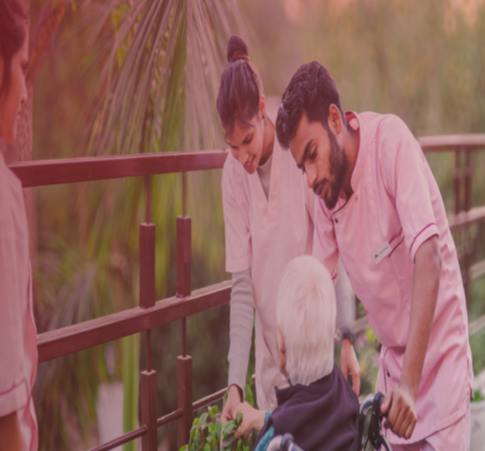With ageing, there is a likelihood of developing health-related ailments, and these often end up compromising the independence of the elderly. We need the overall societal ecosystem to be supportive of the elderly. Our key aim must be to support the elders, so that they stay independent as far as possible, as long as possible.
The WHO published in 2007 a guide that defines the relevant areas to work on to become age-friendly. It looks at 8 domains of citizens’ live that have an impact on how people age. These domains are: housing, transportation, urban spaces and built environment, social participation, civic participation and employment, respect, and social inclusion, access to community support and health services, and communication and information.
Our physical environments such as outdoor and public spaces have a strong influence on personal mobility, safety from injury and physical health of the elderly. They can add to better management of chronic conditions and can also delay serious consequences such as seeking institutional care. Currently, public places are not designed keeping in mind elders or any form of disability in mind. Understandably, elders are nervous about stepping out alone and end up feeling more dependent than they are.
Polished and shiny floors in malls and multiplexes are not great for walkers or wheelers, lack of ramps & limited wheelchair-friendly bathrooms limit social life for seniors. Lack of signage, inadequate lighting, confusing designs, and uneven surfaces – all add to the discomfort of stepping out.
It is also important to facilitate independence for elders staying in our homes.
Decluttering our homes is a simple, yet important step. Elders with vision issues such as cataract or glaucoma may have problems with depth perception. It is important to check for safety hazards such as loose wires, open plug points or sharp corners and objects. Whilst rugs may add color to the floor, anti-skid tiles are more elder-friendly. Elders tend to fall or slip in the bathrooms; and grab bars in the shower and next to the commode can provide a safety net while allowing them to manage things on their own. On the dining table, having solid colors for table mats or crockery makes it easier for them to recognize what’s on the table.
Today, the world sees digitization as a solution to most of our problems, but it may not be the best thing for seniors. In this digital world, how do we ensure that the elders are not left behind? While accessing public or utility services are increasingly becoming app based, we need to ensure that either elders are supported to make this transition or traditional modes of raising complaints or getting in touch is still made available for them.
Elders are comfortable in the physical world, it is easier for them to process information and build trust. After all, how does one trust technology or AI with your most personal tasks like finance? Going to a bank branch and meeting bank officers, getting their pass books updated, or withdrawing cash at the counter would have been their routine in their younger days. Relationship Managers should invest time with older, loyal senior customers to make them comfortable, help them operate the app, or explain the current changes in the processes. In addition to the physical spaces being elder-friendly, staff should also be trained to flag cognitive impairment or onset of dementia which impacts decision-making.
Our culture propagates that it is a civilizational duty to care for our elders, and we need to be sensitive and empathetic towards them. As Mahatma Gandhi said, "The true measure of any society can be found in how it treats its most vulnerable members."













